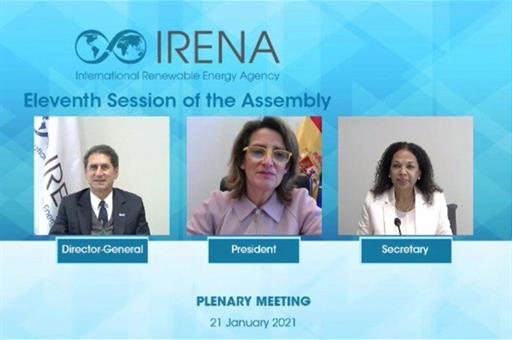Closing event of 11th Assembly of IRENA
Spain boosts cooperation to speed up energy transition and foster deployment of renewable energies
News - 2021.1.21
During the Assembly's closing event - this edition was chaired by Spain in recognition of its involvement and leadership in the ecological transition - the Fourth Vice-President of the Government stated that over these four days of intense sessions, "we have witnessed the importance and commitment from very different countries to the revolution of renewable energies. A revolution that is also tied into the economic recovery in the wake of the crisis of vulnerability associated with the pandemic".
In this regard, Teresa Ribera stressed that "the recovery following the pandemic opens a window of opportunity for us to speed up the transition of our economy towards much clearer patterns of environmental and social sustainability. There is a clear consensus that development must not harm the ecological balance".
During this assembly, "we have seen how the green agenda and energy converge. We have spoken about the overlaps between biodiversity, climate change, health, industry and the transformation of the energy system", highlighted the Fourth Vice-President of the Government, who remarked that the energy transition must be fair and inclusive. "It is essential to pay close attention to the social aspects of the change of model: to protect the most vulnerable groups affected by this transformation and harness the potential to create green jobs".
Green stimuli plans
Teresa Ribera urged the participants to place green investments at the heart of their recovery plans. "We find ourselves at the ideal time to design green stimuli plans that allow us to combat the effects stemming from the pandemic and build strong and resilient economies that create jobs, modernise our industries and prepare us for the future. The evidence is clear: we know that investing in green sectors creates more jobs and offers more short-term profitability per euro invested than more historic forms of investment that do not take sustainability into account, and that investing in renewable energies, energy efficiency and low emissions technologies generate a knock-on effect on the wider economy than those obtained in other economic sectors".
A key year for climate ambition begins with the holding of this event that gathers together the most knowledgeable people in renewable energies. 2021 will be marked by the holding of the UN Climate Change Conference (COP26), the return of the United States to the Paris Agreement and the holding of the United Nations High-Level Dialogue on Energy in New York in September, placing energy transition at the heart of international debate.
Teresa Ribera referred to the announcement of the return of the United States to the Paris Agreement, stressing that "this is the high point of these recent months of accelerated and growing commitment from very different countries around the world; from China to the European Union, Central American countries, countries from Africa and Asia, which have set clear targets on renewable energy issues".
The 11th edition of the Assembly of IRENA virtually gathered some 2,000 participants, including 70 ministers from different countries who, under Spain's presidency, have exchanged experiences and visions on developments in the change of the energy model.
These have been four days of intense sessions characterised by the high level of participation and by the holding of multiple events, including ministerial meetings and a high-level round-table that addressed various aspects related to the energy transition and investment in renewable energies and innovation, green hydrogen, socio-economic policies and the protection of health, at a time in which many countries are pushing through a change of course as a result of the energy transition.
6 million new jobs in three years
During the course of the event, the IRENA Annual Report was also published, which places renewable energies at the heart of global climate action and points out that investment in technology and human well-being make the energy transition an effective tool for achieving a resilient, fair and prosperous future. In this regard, the report shows that the generation of renewable energy has doubled between 2010 and 2019, generating more than 2,500 gigawatts (GW), and points out that investment in renewable energies generated 1.5 million jobs in 2019 and forecasts 6 million new jobs over the next three years.
Consolidation of renewable sector in Spain
Spain will continue to push through measures to foster the rollout of renewable energies over the course of this year, which should be marked by an increase in international ambition. The first renewable energy auction under the new model developed by the Ministry of Ecological Transition and Demographic Challenge will be held on 26 January, which will allow the savings from the rollout of new renewable installations to be passed on to consumers.
In addition, the draft bill to create the National Fund for the Sustainability of the Electricity System (Spanish acronym: FNSSE) will continue with its passage through Parliament in the coming months. This Fund will take on the costs associated with the specific remuneration regime of renewable energies, cogeneration and waste so that they cease to form part of the electricity bill, reducing household electricity bills by at least 13%, thanks to the reduction of charges. In addition, the Ministry of Ecological Transition and Demographic Challenge is drawing up the Storage Strategy, a key element in promoting the rollout of renewable energies and in guaranteeing low prices; and finally, the National Self-Consumption Strategy to develop towards a decentralised energy model.
Non official translation





